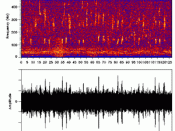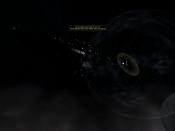Scientific Hypothesis Experiement:
Sonar testing has detrimental effects on marine life
"Surveillance Towed Array Sensor System (SURTASS) Low Frequency Active (LFA) sonar is the U.S. Navy's newest must-have defense technology." The Navy claims that LFA sonar will be able to detect today's "quieter" submarines so reliably that it plans to deploy LFA routinely throughout most of the world's oceans. However, LFA sonar may harm whales and other marine mammals. This sonar will generate one of the loudest sounds that human beings can make in the ocean. Worse, because "they are low-frequency in nature, these sounds can travel for hundreds of miles, effectively ensonifying thousands of cubic miles of ocean."
LFA may damage or destroy marine mammal hearing, as well as disrupt calving, breeding, feeding, and communication. A sound wave can cause material that resonates in its frequency to vibrate, shatter, shear, or tear. Some air spaces in mammals and fish may react to LFA sonar in this manner.
All of this is too high a price to pay for questionable security against the latest breed of submarines.
It is hardly nessecary to perform anymore experiements to prove the idea that sonar waves have adverse affects on marine life due to the high number of beached mammals on our shores. In March 2000, a mass stranding of beaked whales, minke whales, and one dolphin occurred off the Bahamas after a Navy exercise in which mid-frequency active sonars were used. "While beaked whale mass strandings have occurred in the past, this was the first time that a qualified scientist was on hand to collect the appropriate samples from fresh carcasses to determine cause of death." The most recent results of the on-going investigation into this incident indicate that these whales died from the impacts of a loud sound acting on...


